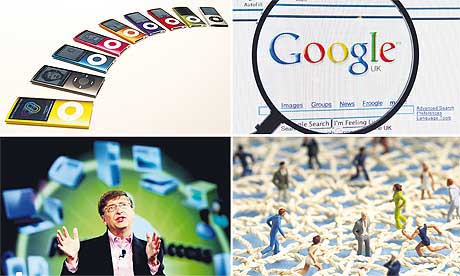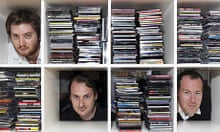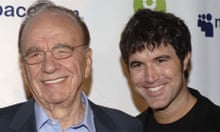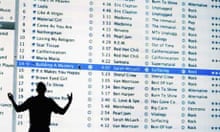The past decade has been the story of three companies, and one increasingly powerful idea. When the decade dawned in 2000, Microsoft was a colossus, with 1999 sales of $19bn and net income of $7.8bn bestriding the online and offline world. It had the best-selling operating system; but in April 2000 it was ordered to split itself into two – an "operating systems" company and an "applications" company – by Judge Thomas Penfield Jackson, who found it guilty of antitrust violations after a trial that revealed much about the company's vicious, no-holds-barred approach to competition. Jackson's ruling – which could have created a fascinating pair of companies – was overturned on appeal in 2001 after comments he made during the trial to a reporter, Ken Auletta, were published in a book.
That left Microsoft free to push on further. But the antitrust trial had broken a little of its spirit; from then on it was always looking over its shoulder for the US justice department (and then in front at the European Commission's antitrust department, which perked up when it saw its transatlantic cousin's success).
Apple turnover
Apple Computer, meanwhile, was struggling: despite the return of Steve Jobs to its top position in 1997, it was having little impact in sales terms with its computers (which was all it had; the iPod was not released until October 2001). Although the original iMac had been a hit in fashion terms the company was making little headway financially. Its $6bn of sales (up 3%) and $601m profits (up 94%) for fiscal 1999 were at least growth, after three years when it shrank and made horrendous losses (though it still had $3bn in the bank).
But in late 2000, it made a fateful – and game-changing – decision: it bought Soundjam MP, a popular MP3-playing program for the Mac, and the services of its head programmer, Jeff Robbin. Steve Jobs would later insist that his team had seen the future, seen the coming of miniature hard drives able to store gigabytes of data, had positioned Apple to take advantage of it. Either way, the gamble was to pay off.
Meanwhile the internet had everyone excited – though it was still a world reached by dialup. A survey in October 1999 by Continental Research reckoned that 18.6m Britons had internet access, spending an average of 17 minutes a day (8.5 hours per month) online. AOL and Time Warner leapt into what they hoped would be a synergistic $109bn merger, where people would lap up mass-media content via a walled garden internet connection. It turned out to be monumental hubris, one of the greatest destructions of shareholder value ever seen. Why? Because as the decade progressed, and particularly from 2001 onwards – when Wikipedia was set up by Jimmy Wales (below) and Larry Sanger, using the "wiki" software that had come of age – the power of the crowd, and people's ability to use the internet to their own ends, not those of content generators, became central to the internet experience.
Allied to the growth of the crowd was the rise of Google – which uses the power of the crowd to determine where sites should be placed in its ranking. At the start of the decade Google was a good idea struggling to find a business model. During 2000 it introduced text adverts though they were, it admits, "rather primitive". Crucially, though, that year it won a contract to become Yahoo's default search provider. Having ended 1999 serving 7m search queries daily (compared to AltaVista's 50m), by the end of 2000 it was handling 100m. Nowadays, it makes more than 300m every day – 109bn a year.
But Google was still a minnow in revenue terms; for 2000 its revenues were just $19m, but its costs were $34m – a loss of $17m. It moved narrowly into profit in 2001 ($86m revenues, $10.9m profit) but only truly motored in 2003 with the introduction of Google Mail, when it worked out how to generate ads against any text. That meant it could offer ads on any website, not just against searches, and its revenues – and profits – burgeoned.
Then, in the middle of the decade, came broadband. Imperfect, frustrating, but such a relief compared to dialup that we stampeded online: Britons now spend roughly 120 hours every month using the net.
And what are we doing? The decade saw an explosion in content generation by people who had previously had little opportunity to. Website building (such as the now defunct GeoCities), forums, and then blogs gave people a medium they'd never had before. Wikipedia benefited as people lent it their expertise: "crowdsourcing" became more and more powerful, breaking through to the public consciousness when the grainy pictures from the London bombings in July 2005 told the story the normal media couldn't.
Hello, everyone
As the decade wore on, that creative outpouring migrated to the new "social networks" such as MySpace and Facebook, where longer blogposts were replaced by bite-sized remarks; this reached its apotheosis with Twitter, limiting remarks to text-message length. Google and Microsoft's (struggling, but reborn) web search integrated Twitter feeds; and so the thoughts of the crowd became available to itself. AOL and Time Warner, meanwhile, were left in the cold, unable to compete for content creation with millions of individuals, and unable to corral them in high-profit internet walled gardens. This month the merger was in effect dissolved: AOL was refloated, valued at $2.4bn; Time Warner, at $35bn. Where did the other $72bn go? It vanished into the crowd.
But another form of silent crowd also emerged in the decade: botnets – hundreds or thousands of compromised Windows machines, used for sending spam, hosting phishing sites, and attacking specific sites. Windows XP's general lack of security meant botnets were the first instance of "cloud computing", available for hire by the hour by miscreants and spam artists. Botnets are the surest sign of the failure of the decade to cope with the downside of a crowd – that nobody takes responsibility. (It will be interesting to see whether Google's Chrome OS can roll back the tide of malware.)
Apple went from strength to strength as the iPod gave individuals the power to choose the soundtrack to their lives. Its annus mirabilis began in Christmas 2003, when the popularity of the new iPod mini saw 733,000 sold in a quarter – nearly as many as in the previous two years. The iPod and the new iTunes Store drove Apple's reputation. It followed it in 2007 with the long-rumoured iPhone (and sibling non-phone iPod touch), cannibalising its own successful product while reaching into a new market. (It also sold more computers than ever before.) It ended its fiscal 2009 in September with revenues totalling $36.54bn – each quarter bigger than the whole of 2000 – and profits of $5.72bn. Dell, the premier PC maker at the start of the decade, scrabbled around, lost in a commoditised battle. Apple could now buy it outright using just the cash it has in the bank.
Cloudy forecast
But Microsoft has seen its profits eroded. Though 2009 revenues were $58bn, and net income $14bn, it has looked under threat as the internet has become a greater part of our lives. If you have storage and computing in the "cloud" (as Amazon and Google offer), and if open source programs such as OpenOffice can do many of the jobs that Microsoft Office can, why upgrade? Google in particular is undermining Microsoft by offering what it does, but for less: first, with Google Mail, which offered 1GByte of storage for free, when Hotmail and Yahoo charged for more than 10MB. Then with its online word processing and spreadsheets. Then with its Android phone OS, undercutting Windows Mobile. And next with Chrome OS, undercutting Windows on notebooks. Most recently, Google has started offering DNS lookup services, something nobody would trust to Microsoft. Which is in itself telling as the decade ends: Google, though dominant in a technology we rely on, doesn't worry us as Microsoft did – and still does.
But, as Nick Carr has observed, Google has realised that its future is on the internet, where it makes its money (through advertising and other services); thus every effort it makes is to get more people online. Microsoft's aim was to get a computer on every desk. The internet wasn't part of it. The question for the next decade, as the crowd discovers itself, is whether Microsoft will vanish in the cloud – or if it will manage to redefine and reinvent its reason for existing. In retrospect, Thomas Jackson's suggestion of a split may have been a good one.






Comments (…)
Sign in or create your Guardian account to join the discussion